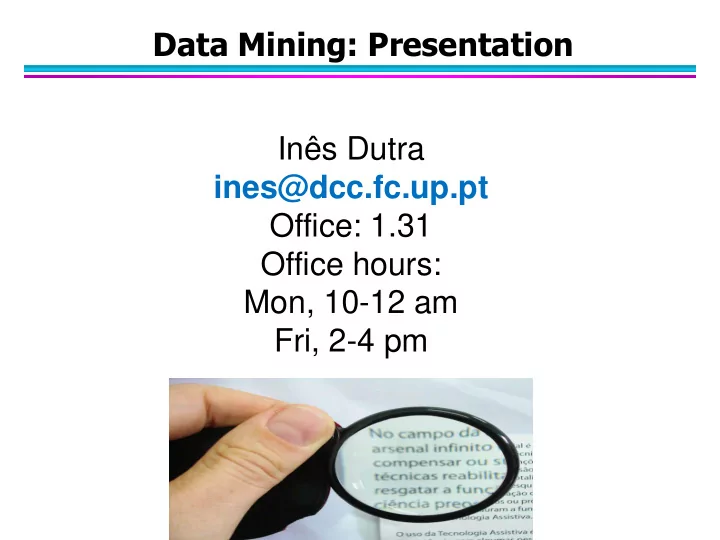

Data Mining: Presentation Inês Dutra ines@dcc.fc.up.pt Office: 1.31 Office hours: Mon, 10-12 am Fri, 2-4 pm
Evaluation Assignments (2): 8 points 2 Tests: – Nov 6th – Dec 18th OR Exam: 12 points Best score between Test and Exam is considered Paper reading and discussion
Communication In person Email: ines@dcc.fc.up.pt (PLEASE, DO NOT SEND EMAIL TO dutra@fc.up.pt ) Always use a subject prefix DM1 in your messages Sign your messages, so that I can identify you by more than a number Other means: – Moodle (warnings, news, and forum) – dm1-1516@dcc.fc.up.pt Discipline web page: http://www.dcc.fc.up.pt/~ines/aulas/1516/DM1/DM1.html
Syllabus What is data mining? Data versus knowledge Kinds of data Phases of data mining Data Preprocessing Descriptive Statistics Association rules Clustering Predictive Models Performance Metrics and model validation
Bibliography Data Mining Concepts and Techniques (3 rd ed) Jiawei Han, Micheline Kamber and Jian Pei Introduction to Data Mining Pang-Ning Tan, Michael Steinbach and Vipin Kumar
Resources For programming and libraries – R and stats and machine learning packages – PyML For data visualization and machine learning – WEKA – KNIME – RapidMiner For relational learning – Aleph and YAP – GILPS
Useful links KDD nuggets: http://www.kdnuggets.com Data Sets at UCI: http://archive.ics.uci.edu/ml/ http://www.acm.org/sigs/sigkdd/explorations/ https://www.kaggle.com/
8 The Homo Platipus (excellent insight by Carlos Somohano, Founder of DataScience London) Machine Learning Visualization Hacking Statistics Math Science Programming Data Mining
9 The Homo Platipus (excellent insight by Carlos Somohano, Founder of DataScience London) Machine Learning Visualization Hacking Statistics Math Science Programming Data Mining More commonly called: Data Scientist!
Requirements Willingness to learn Lots of patience – Interact with other areas – Data preprocessing Creativity Rigor and correctness Let’s have fun!
Data x knowledge Data: – refer to single and primitive instances (single objects, people, events, points in time, etc) – describe individual properties – are often easy to collect or to obtain (e.g., scanner cashiers, internet, etc) – do not allow us to make predictions or forecasts
Data x Knowledge Knowledge – refers to classes of instances (sets of...) – describes general patterns, structures, laws, principles, etc – consists of as few statements as possible – is often difficult and time-consuming to find or to obtain – allows us to make predictions and forecasts
Criteria to assess Knowledge correctness (probability, success in tests) generality (domain and conditions of validity) usefulness (relevance, predictive power) comphreensibility (simplicity, clarity, parsimony) novelty (previously unknown, unexpected)
In the science domain, focus is on: – correctness, generality and simplicity In economy and industry, focus is on: – usefulness, comprehensibility and novelty “We are drowning in information, but starving for knowledge” ( John Naisbitt )
Recommend
More recommend